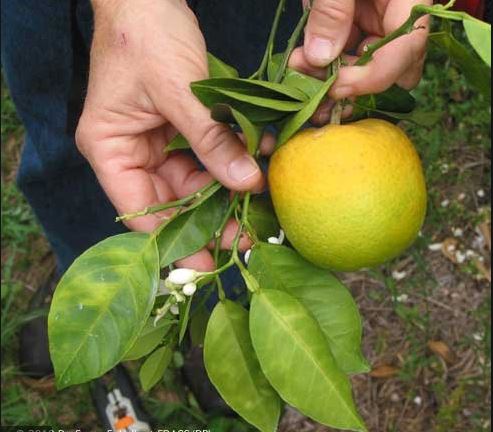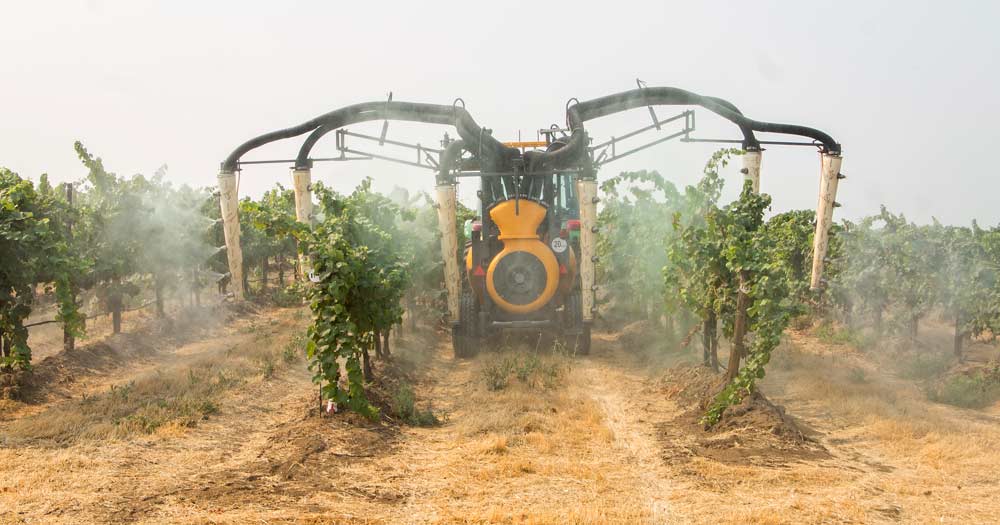Will there be a spray-on cure for Piearce's Disease?
A grape-derived peptide holds promise as testing continues
The following is reprinted from Wine Business Monthly’s August 2020 issue. Read the original article here.
I recently spoke with some of the players on the team: Michelle Miller, Co-founder and Manager of Innate Immunity, Goutam Gupta, Senior Research Scientist of the New Mexico Consortium and Pete Downs, technical advisor to them for the PD project. They were very optimistic about the effectiveness of their product. Of course they would be – it’s their brainchild. But their initial results were encouraging enough to garner funding from the board, the first private organization to be recommended for funding by the PD/GWSS board.
Similar peptides have been used for other bacterial pathogens in other hosts. For instance, huanlongbing, or citrus greening disease, is caused by a phloem-mobile bacterium and peptides have been developed against it. Likewise, peptides against fireblight disease in pome fruits have been developed. These peptides augment the plant’s natural pathogen immune systems, of which plants have limited natural ability to ward off serious disease agents like Xylella fastidiosa.

Preliminarily, they tested the grape-targeted product in commercial vineyards on vines that were known to be infected by Xylella. About three dozen vines were treated while they were either dormant or just starting to break out of dormancy. The peptide was applied in a spray along with a commercial adjuvant called Pentra-Bark, which allows the product to move through the tough bark of the vine and into the internal vascular system. So, the product can be applied before the growing season even starts, but it can be applied at other times as well.
They applied the material either once or twice to the vines and provided a control treatment that contained only the Pentra-Bark surfactant without peptide. They later tested the tissues for the presence or absence of Xylella bacteria using QPCR techniques and found that the peptide-treated vines were cleared of the bacteria. And the clearance of bacteria was 100%; not partial. That is a rather satisfying result.
I mean, can this peptide cure PD? Early results suggest yes.
The peptides are not completely natural. They are initially chemically synthesized. They then transform tobacco plants to produce the peptides that they have synthesized. So, while the process is not something that can be replicated in nature, the process of using a plant to produce the active ingredient puts this material in the realm of a biopesticide. It’s not considered to be organic, however, so keep that in mind.
With the new CDFA funding, the group will expand testing into a variety of commercial vineyards known to have problems with PD. The first trial will be in Sonoma County, the second in Kern County and the third in Santa Barbara County. The trials will be two years in length and they have chosen locations with a variety of climates and insect vectors. The goal of these trials is to confirm the efficacy of the products but also to determine the lowest concentration of material that can be effective, the number of applications needed, and also discover what the longevity is for protection. My guess is that the trials will need to go longer than two years, but after two years they should know if this approach will have traction or not. I’m hoping it will.

Preliminary toxicity analyses look promising, but if this is to be commercialized, the toxicity testing will need to be much more expansive. The product in powder form, and considering it is not a living organism, it has a long shelf-life. A patent has been applied for by the company for this product.
Perhaps even more exciting, but not yet in testing phase, is the possibility that this technology could be used against plant viruses, potentially including leafroll and red blotch. The peptides target the viral coat proteins and can be delivered into the host plant using techniques such as nano particles or even virus vectors. I would hate to get overly excited about the idea that this type of approach could be used to clear out viruses from our vineyards, but it sure is an intriguing thought. I mean, could you imagine the applicability of this product if it could do so? I would estimate that about half of our acreage of winegrapes have economically-damaging levels of one or more strains of these two virus diseases so a spray-on cure would be truly remarkable an a potential savior for the industry. While it is too early to get excited, it is quite an exciting possibility if it ever comes to fruition.
We shouldn’t lose sight of the other approaches being researched and developed to control Pierce’s Disease, like those I mentioned previously. We may very well need a combination of approaches. But this is an exciting development and it sure would be great to have PD in our rear-view mirror some day.
Photo credits
Main photo: Alley, L. (2016, January 08). Napa and Sonoma Vintners see a surge in Vine-killing Pierce’s disease. Retrieved April 16, 2021, from https://www.winespectator.com/articles/napa-and-sonoma-vintners-see-a-surge-in-vine-killing-pierces-disease-52581
Blue-green Sharpshooter – GRAPHOCEPHALA atropunctata. (n.d.). Retrieved April 15, 2021, from https://bugguide.net/node/view/1273608/bgimage
Pest Net. Retrieved April 15, 2021, from http://www.pestnet.org/fact_sheets/citrus_huanglongbing_greening_230.htm
Glassy-winged Sharpshooter. (n.d.). Retrieved April 15, 2021, from https://www.countyofnapa.org/1278/Glassy-winged-Sharpshooter
Macdonald, G. (2015, June 03). The age of phage? World first cgmp certification for phage therapy plant. Retrieved April 15, 2021, from https://www.biopharma-reporter.com/Article/2015/06/03/The-age-of-phage-World-first-cGMP-certification-for-phage-therapy-plant
Prengaman, K., (2019, May 29). Vineyard sprayers: Applying knowledge. Retrieved April 15, 2021, from https://www.goodfruit.com/vineyard-sprayers-applying-knowledge/


